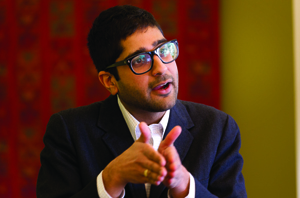Game Changer
When it Comes to the State of Video Games, Scholar Sonny Sidhu ’09 is not Panicking

“I have a unique perspective as somebody who understands, recognizes, and cares deeply about social and cultural issues,” says Sonny Sidhu ‘09 as he imagines his place in the video-game-development industry. “I also love games. I don’t think they’re currently broken; I think they can be better.” Photo by Laurence Kesterson
When Sonny Sidhu ’09 was 5, he successfully pitched the merits of a Nintendo gaming system to his parents—so successfully, his argument still resonates. Now a Massachusetts Institute of Technology graduate student, Sidhu made the case for video-game development as a natural fit within the liberal arts as a featured speaker at the College’s Visualizing Media Futures symposium this spring.
“Most 5-year-olds probably don’t have to formulate a cogent argument for why a game could have intrinsic value, but I did,” Sidhu, a film and media studies graduate, says. “Since then, I don’t think there has been a point in my life when I wasn’t playing games.”
Sidhu, who cites his pregnant mother’s Pac-Man addiction as “prenatal exposure” to video gaming, grew up right alongside the video-game console boom of the early ’90s. From watching his father program Atari 2600s for fun to traversing the familiar arc of preferring “Mario to Zelda and eventually Zelda to Mario,” he recalls a childhood full of not just gaming but also a fascination with game graphics, stories, and musical scores.
Sidhu originally planned to pursue filmmaking—until he took a video-game course with Bob Rehak, associate professor of film and media studies.
“I’d always been sketching level designs [for video games] on the back of assignments in grade school,” he says. “[During Rehak’s class] it came to me in a flash: I’d been occupying myself with cinema because it was an avenue into media, but if I wanted to apply myself, I should be in games.”
In his presentation at the College, Sidhu stressed the interdisciplinary nature of video-game development, which relies upon disparate fields—from computer science to choreography. He admits that during his years as a Swarthmore undergrad, software was too esoteric and cost-prohibitive to give way to a full-blown video-game–development curriculum. Thanks to more accessible software and hardware, that’s all changed. “I like to think that somewhere on campus right now, there’s someone hacking away at his or her own indie game,” he says.
As a comparative media studies master’s candidate, Sidhu has been immersed in the rapidly expanding and ever-nascent field of video-game theory, focusing his own research on how particular design techniques complement the phenomenon of gamers’ feeling as though they are present in two places at once—the game world and the real world. He’s also put his passion to work in the practical sphere as the lead designer and producer for the MIT Game Lab’s 2011 release A Slower Speed of Light. A surprise success among Internet players, the first-person game progressively slows the speed of light to the speed of walking, replete with all the helter-skelter visual effects of travel at the speed of light.
Flashing forward, Sidhu hopes to follow his passion to make video games and fulfill his belief that “fun, really appealing games that don’t traffic in problematic representations” can make a more positive contribution to society and culture, without sacrificing commercial appeal. He says he’s fairly confident, given his knowledge of other media, that the industry will self-correct what he perceives as its biggest shortcoming and give way to more equitable portrayals of gender, ethnicity, sexual orientation, and socioeconomic experience in game narratives.
“At Swarthmore, we always took a loooong historical view of media,” says Sidhu. “When people discuss moments of transitions and disruptions within the industry, sometimes I’m the only person in the room not panicking. That comes directly out of that historical view. If hands-on production experience had to be sacrificed to get that complexity and depth of knowledge about media, then I’d make the same choice every time.”
To hear Sonny Sidhu’s campus talk, click here
 Email This Page
Email This Page